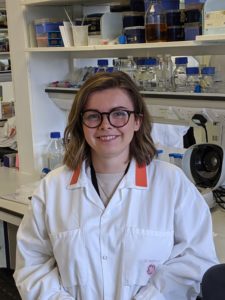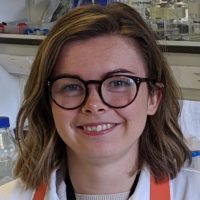About me
I completed an integrated masters degree in biology at The University of Sheffield in 2018. My MSc project inspired me to study plant parasitology further, as I became passionate about researching prevalent crop diseases to help provide global food security. My PhD focuses on plant-parasitic nematodes which are global crop pests, destroying billions of dollars’ worth of crop yields all over the world each year. Therefore, to get the chance to learn more about how plant-parasitic nematodes are able to feed from plants was something I was very interested in!
My project
 My project investigates how nematodes manipulate the plant secretory pathway. To successfully infect the host, plant-parasitic nematodes manipulate plant roots to form a highly specialised feeding site. Vast subcellular changes occur during the formation of the nematode feeding site, including large changes to plant secretory pathway organelles.
My project investigates how nematodes manipulate the plant secretory pathway. To successfully infect the host, plant-parasitic nematodes manipulate plant roots to form a highly specialised feeding site. Vast subcellular changes occur during the formation of the nematode feeding site, including large changes to plant secretory pathway organelles.
The first aim of my project is to monitor changes to the plant secretory pathway which occur during the formation of the feeding site. The second aim of my project is to investigate how effector proteins secreted by the nematode use the plant secretory pathway to be translocated to their site of action. For this, I’m focusing on nematode effectors which mimic the plant peptide hormones CLAVATA3/EMBRYO SURROUNDING REGION-RELATED (CLE) and C‐TERMINALLY ENCODED PEPTIDE (CEP). My project investigates the hypothesis that these effectors use the plant secretory pathway to be translocated from the cytoplasm to the apoplast within host root cells.
Connect
Twitter: not available
LinkedIn: not available

